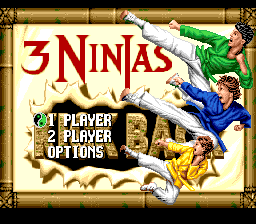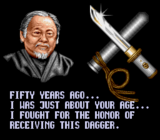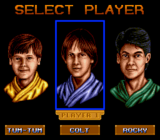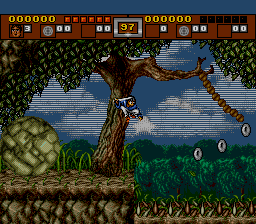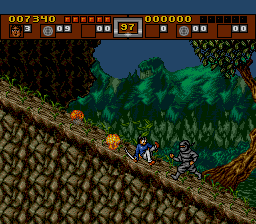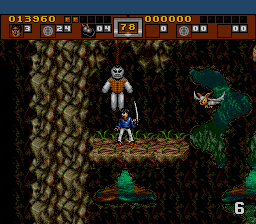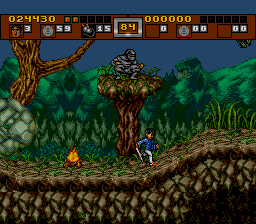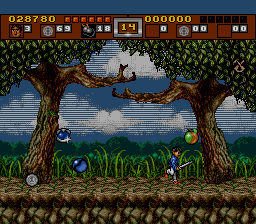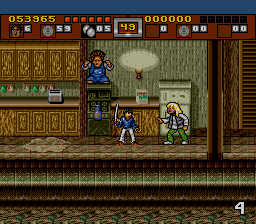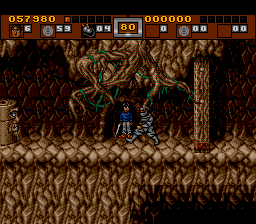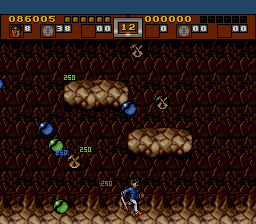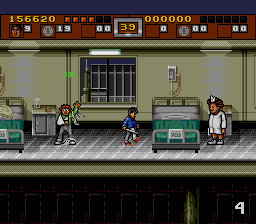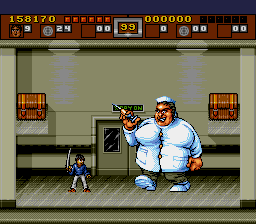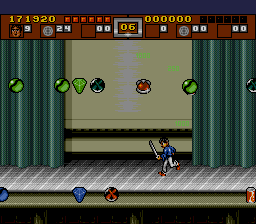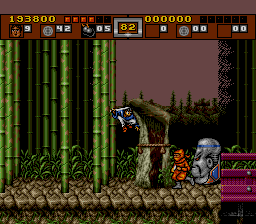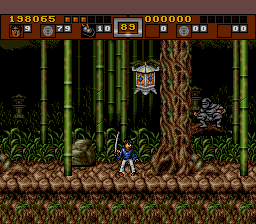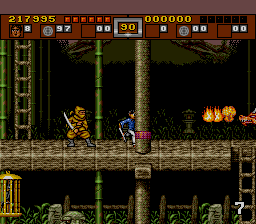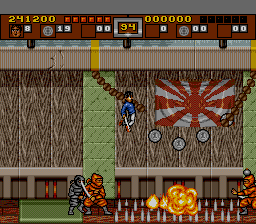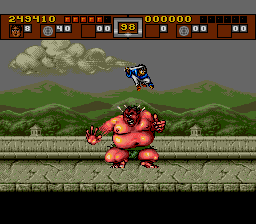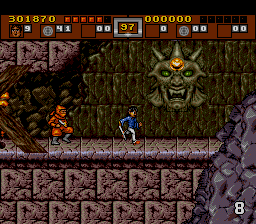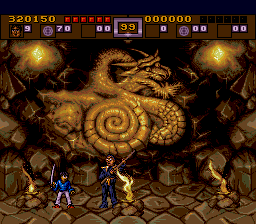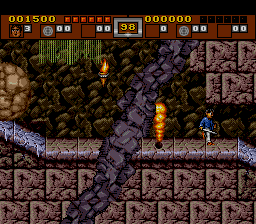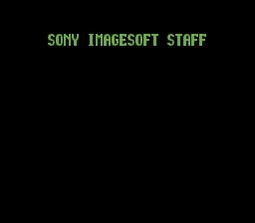3 Ninjas Kick Back
From Sega Retro
| 3 Ninjas Kick Back | ||||||||||
|---|---|---|---|---|---|---|---|---|---|---|
| System(s): Sega Mega Drive | ||||||||||
| Publisher: Sony Imagesoft | ||||||||||
| Developer: Malibu Interactive, Psygnosis | ||||||||||
| Sound driver: Psygnosis/Martin Walker | ||||||||||
| Genre: Action | ||||||||||
| Number of players: 1-2 | ||||||||||
| ||||||||||
|
3 Ninjas Kick Back is a platforming game developed by Malibu Interactive and published by Sony Imagesoft in 1994 for the Super NES and Sega Mega Drive (ported by Psygnosis) exclusively in the US to tie in with the 1994 film of the same name.
Having once set to appear separately for the platform[1], the game was bundled with Hook in the 3 Ninjas Kick Back / Hook compilation for the Sega Mega-CD.
Contents
Story
The master samurai Mori competed in a ninja tournament fifty years ago for a magical dagger and an ancient samurai sword thought to be the key to opening a hidden cave full of treasure. After winning the tournament and rightfully gaining the dagger, it was stolen by the master's archrival, Koga. Though the master searched far and wide, he never found any trace of Koga or the dagger. Now, too old to continue searching, the master sends his three grandchildren, whom he has trained in the ninja arts, the young brothers Rocky, Colt, and Tum Tum, to assist him in retrieving the prized dagger. Once it has been restored to its rightful owner, the dagger shall once again be passed along to younger generations, through the winners of the ninja tournament.
Gameplay
The game is a side-scrolling action platformer played as the three young ninjas from the film. It can be played by two player simultaneously, with each player controlling a different character. The goal of each level is to make it to the end or to complete some other objective explained beforehand, such as destroying certain targets or collecting items. On these levels, a counter appears in the bottom-right that shows how many objectives remain.
The three brothers play similarly but have different weapons and special abilities. Tum Tum, the youngest brother, is armed with a pair of sai. He is the smallest and fastest. Rocky is the eldest brother and carries a staff. He is the slowest but the strongest. Colt is the middle brother and uses a katana. His attributes are in between the other two. The ninjas walk with ![]() or
or ![]() and crawl with
and crawl with ![]() or
or ![]() . They crouch with
. They crouch with ![]() and jump with
and jump with ![]() . They can grab ropes and platforms (including branches) by pressing
. They can grab ropes and platforms (including branches) by pressing ![]() while jumping in front of them. They can pull themselves up a platform with
while jumping in front of them. They can pull themselves up a platform with ![]() +
+![]() or jump down with
or jump down with ![]() +
+![]() . They climb ladders with
. They climb ladders with ![]() and
and ![]() . In some levels, there are areas in the background that characters can hide in with
. In some levels, there are areas in the background that characters can hide in with ![]() to avoid enemy projectiles.
to avoid enemy projectiles.
The ninjas attack using their weapons with ![]() , which can also be done while crouching. They attack in midair by kicking. Their attacks can be temporarily augmented with ranged shots by collecting a Blue Crystal Ball item: Tum Tum shoots a single miniature sai, Colt shoots three daggers in a spread, and Rocky shoots three shuriken in a spread. The ninjas perform a special defensive move, swinging their weapons in the air while standing in place, with
, which can also be done while crouching. They attack in midair by kicking. Their attacks can be temporarily augmented with ranged shots by collecting a Blue Crystal Ball item: Tum Tum shoots a single miniature sai, Colt shoots three daggers in a spread, and Rocky shoots three shuriken in a spread. The ninjas perform a special defensive move, swinging their weapons in the air while standing in place, with ![]() +
+![]() . Each ninja also has a special ability, performed with
. Each ninja also has a special ability, performed with ![]() +
+![]() , where they jump into the air while spinning with their weapons. However, using this ability costs one point of health. The ninjas can also acquire bombs in the levels, which are used with
, where they jump into the air while spinning with their weapons. However, using this ability costs one point of health. The ninjas can also acquire bombs in the levels, which are used with ![]() . Bombs are limited in supply. Hidden passages can sometimes be blown open with bombs.
. Bombs are limited in supply. Hidden passages can sometimes be blown open with bombs.
The ninjas have five hit points and lose a life when they run out of hit points of the timer runs out. They restart the level at the beginning or the last checkpoint. In two-player games, when one player loses a life, he does not respawn until the other player also loses a life or completes the level. The game ends if the players run out of lives. Extra lives are awarded at 10,000, 25,000, 50,000, and 100,000 points and then every 100,000 points after that. There are three difficulty levels (Easy, Normal, and Hard). Easy mode has passwords for each level.
Items
| Treasure Chest | |
|---|---|
| Destroy to release an item. | |
| Item Box | |
| Attacking it causes it to release an item after a moment. Hitting it multiple times spins it around for a different item. | |
| Tokens | |
| Collect 100 for an extra life. | |
| Glass Orb | |
| Awards 250 points. | |
| Gemstone | |
| Awards 500 points. | |
| Flashing Orb | |
| Awards 1,000 points. | |
| Soda | |
| Restores 1 hit point. | |
| Apple | |
| Restores 2 hit points. | |
| Hamburger | |
| Restores 3 hit points. | |
| Yin Yang Symbol | |
| Fully restores the ninja's health. | |
| Yellow Crystal Ball | |
| Temporarily boosts the ninja's strength. | |
| Blue Crystal Ball | |
| Temporarily augments the ninja's attack with ranged shots. | |
| Red Crystal Ball | |
| Destroys all enemies on the screen and often knocks items down. | |
| Masks | |
| Collecting the mask corresponding to the current ninja (yellow for Tum Tum, blue for Colt, or green for Rocky) awards an extra life. Awards 5,000 points otherwise. | |
| White Bombs | |
| Equips 5 white bombs (or gives the player another 5 bombs if already equipped). White bombs are dropped downwards onto the ground. | |
| Black Bombs | |
| Equips 5 black bombs (or gives the player another 5 bombs if already equipped). Black bombs are thrown forwards in an arc. | |
| Hourglass | |
| Adds another 10 seconds to the timer. | |
| Checkpoint | |
| After passing a checkpoint, the ninjas are revived there after losing a life. |
Levels
| The Woods | |
|---|---|
| The Cabin / The Cave | |
| The Hospital | |
| Japanese Garden / The Dojo | |
| Castle Osaka | |
| The escape segment is only played after defeating Koga if the players failed to find all of the gold stones in the first level. |
Production credits
- Producer: Nathan Rose
- Assistant Producer: Mark Smith
- Executive Producer: Richard Robinson
- Game Testers: Jose Cruz, Tobin A. Russell, Seth Luisi, Bruce Cochrane, Jody Kelsey Jr., Andre Leighton
- Programming: Tim Coupe
- Game Design: Terry Lloyd
- Based on an Original Idea by: Nathan Rose, David Jaffe, Mike Giam
- Additional Programming: Philip Watts
- Background Art and Map Design: Terry Lloyd
- Sprite Art and Animation: Dean Betton, Lee Pullen, Terry Lloyd
- Music and Sound Effects: Jason Page, Richard Joseph
- Manager: Ian McGee
- Story Artwork: Dean Betton
- Game Testers: Tony McColgan, Mick Thompson, Matthew Lloyd, Paul Colls, Jun Jun Caliva, Kevin Mulhall, Jason Uyeda, Bill McDonald
- Compression Software: Rob Northen
Magazine articles
- Main article: 3 Ninjas Kick Back/Magazine articles.
Physical scans
| Sega Retro Average | |||||||||||||||||||
|---|---|---|---|---|---|---|---|---|---|---|---|---|---|---|---|---|---|---|---|
|
| 46 | |
|---|---|
| Based on 3 reviews | |
Technical information
ROM dump status
| System | Hash | Size | Build Date | Source | Comments | |||||||||
|---|---|---|---|---|---|---|---|---|---|---|---|---|---|---|
| ✔ |
|
2MB | 1994-10 | Cartridge (US) |
References
- ↑ Mega Power, "November 1994" (UK; 1994-10-20), page 7
- ↑ File:3 Ninjas Kick Back MD credits.pdf
- ↑ 1700 igr dlya Sega, "" (RU; 2001-xx-xx), page 23
- ↑ Sega Opisaniy i sekretov, "14000 Opisaniy i sekretov" (RU; 2003-03-11), page 5
- ↑ VideoGames, "March 1995" (US; 1995-02-xx), page 83
| 3 Ninjas Kick Back | |
|---|---|
|
Main page | Comparisons | Maps | Hidden content | Magazine articles | Reception | Region coding | Technical information | Bootlegs | |
